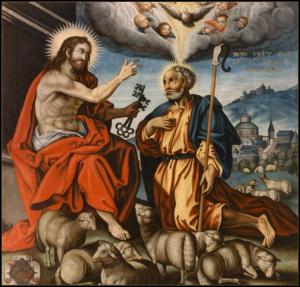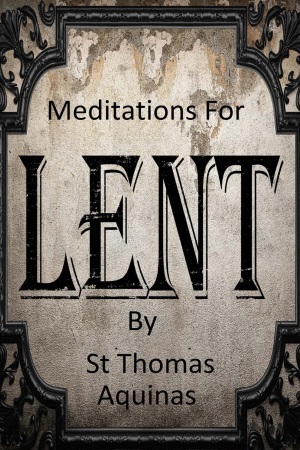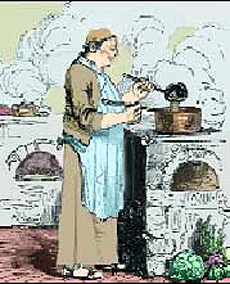January 2018: Olive Tree

Volume II/Issue 21/January 2018

From The Editorial Desk:

His Holiness has asked us to focus on prayer more this year. And because we celebrated the feast day of the Holy Family this month and The whole month of February is dedicated on focusing on the Holy family. I thought I would write an editorial combining prayer and family. To be specific. I wanted to give:
Four Principles of Praying for Your Family
Praying for your family may be the most daunting task you will ever undertake. We find it easier to pray for people who we do not know than to pray for our own families. We know the deep problems of those so close to us. We know where they have messed up, and often it seems like an impossible situation. We forget that God specializes in the impossible.
1. God deeply loves your family.
He is a good God. I know that sounds very basic, but it is also deeply profound. Without a conviction about the goodness and love of God stamped into our hearts, we will become weary and cease praying for our families.
God loves your family and has a plan for each and everyone of them.. Moreover, He understands each and everyone of them. He loves them. He knows everything about them, and He knows how to gently draw them to Himself.
2. There is a second important truth—praying with faith.
Jesus said, “And in all things whatsoever you shall ask in prayer, believing, you shall receive.” (Matthew 21:22). Faith in our Father in Heaven energizes us. It gives us the ability to come into His presence continually. Faith brings us back to the goodness and greatness of God. When we see Him, faith and trust should rise in our hearts.
When you are praying for a family member who left the Church and has no interest in serving God, What role does a prayer of faith play in the salvation of your family, and how much of their salvation depends upon God’s sovereign grace? That is an impossible question to answer. All I know is that our salvation is 100 percent God’s doing. God saved us by His grace and His grace alone. I cannot force a person to become a Christian—even through my prayers.
Prayer is a part of His great plan and His wonderful mystery. It is the meeting place—where the Sovereignty of God and the Will of Man intersect. It is the place where faith rises and moves mountains that have stood in the hearts of our families for generations.
3. The third principle was patience and persistence.
We live in a generation that demands instant gratification. We learn to wait upon Him in two ways: over a long period and with a deep-seated belief that He will answer our prayers.
We wonder why the answer does not come immediately. Perhaps it is because God longs to have fellowship with us and mold us into His image. Waiting upon Him is an act of dependence upon Him.
Prayer opens hearts. It throws doors open wide. It brings you to places you would never have dreamed and arranges circumstances that would be impossible to produce by yourself. When you learn to wait in His presence, He works in unfathomable ways. That is why the Psalmist said, “Upon God alone, O my soul, rest peacefully; for my expectation is from him.” (Psalm 62:5).
4. Finally, God taught me to pray with a humble, repentant heart.
You can be praying for a family members repentance, but the greatest need just maybe a deep repentance in your own heart. When I look back upon praying for my family members, I can clearly identify a moment when things began to change in them. They began to change when I began to change.
One day when I was having a time alone with God, the Holy Spirit opened the hidden parts of my heart and began to search them. One of the things God made known during those moments was an attitude I had not been willing to face. I had been an ungrateful for my family. I had never expressed my love and appreciation for all they were to me and all they had done for me. Selfishness was the root cause of that attitude. I never saw what their needs were because I was so wrapped up in my problems and myself.
When God opened my eyes to see my sins, I was broken. Things began to change in my relationship with family members from that moment on. My brokenness softened the soil of their hearts. My repentance made the ground fertile.
Develop your relationship with Him
The greatest encouragement I can offer you about praying for your family is to ask God to search your heart and show you anything that needs removing from your life. The release of God’s Spirit upon their lives begins in your heart and soul. Find a time and place to meet with God. Get to know Him as “our Father.” See how “Hallowed” and mighty He is in heaven.
As you develop an intimate relationship with Him, faith will rise in your heart and patience will rest on your soul. God will change you more than God will change the person for whom you are praying.
Wait upon the Lord.


Chair of Unity Octave
Prayer
V/ That they all may be one, as Thou, Father, in Me and I in Thee; that they also may be one in Us; that the world may believe that Thou hast sent Me. (John 17:21.)
V/ I say unto thee, that thou art Peter; R. And upon this Rock I will build My Church.
V/ LORD Jesus Christ, Who saidst unto Thine apostles; Peace I leave with you, My peace I give unto you; regard not our sins, but the faith of Thy Church, and grant unto her that peace and unity which are agreeable to Thy will. Who livest and reignest God forever and ever. R/. Amen.
The Chair of Unity Octave begins on January 18th, the Feast of Saint Peter's Chair at Rome and ends on the 25th, the Feast of the Conversion of Saint Paul.
In the Epistle for the Second Sunday after Epiphany, which occurs before or during the Unity Octave, we read: “Being of one mind one towards another.” The essence of unity is in all of the Church being of one mind. We must all think out of the same head, that is think the same things. Therefore we must unite our thinking with the Head of the Church. The invisible head of the Church is Jesus Christ. To aid us in thinking with Jesus, we have the doctrines and morals Jesus teaches us through His Church. Reject one of these teachings, as we cease to be Christian, no matter what we may call ourselves.
Saint Paul says: “We have the mind of Christ.” (II Corinthians 2:16) Jesus Christ is the center and source of our unity. We must have the mind of Christ. Let us consider how we can obtain the Mind of Jesus Christ.
The best way to have the mind of Christ is to study what Jesus said and did, which we find in the Gospels. In the Gospels Jesus prays to the Father: “That they all may be one, as thou, Father, in me, and I in thee; that they also may be one in us; that the world may believe that thou hast sent me.” (John 17:21)
“I in them, and thou in me; that they may be made perfect in one: and the world may know that thou hast sent me, and hast loved them, as thou hast also loved me.” (John 17:23)
Jesus is praying that the Father may be in Him and that He may be in the Apostles. Consider how closely united Jesus desires to be with us, His sheep in His fold, the Church.
Saint Paul tells the Ephesians (4:3-6): “Careful to keep the unity of the Spirit in the bond of peace. One body and one Spirit; as you are called in one hope of your calling. One Lord, one faith, one baptism. One God and Father of all, who is above all, and through all, and in us all.”
Another thing that is very important is to know what the Church teaches. This we learn in the basic Catechism. Saint John Vianney says that the majority of Catholics that go to hell, do so because they do not know their own faith.
Let us pray for unity in and with the Church.
Let us consider the history of this devotion:
On October 3, 1899, the eve of the feast of St. Francis of Assisi, the Rev. Lewis Thomas Wattson, an Episcopal clergyman later known as the Very Rev. Paul James Francis, S.A., arrived at Graymoor, N.Y. to establish a community of Episcopal Franciscans called the Friars of the Atonement. A year previously, Miss Lurana White, a devout young woman, had founded in the same place a community of Episcopal nuns known as the Sisters of the Atonement.
For ten years the two communities were jointly known as the Society of the Atonement and lived the monastic life as members of the Protestant Episcopal Church. Looking about him on a largely irreligious world, Father Paul grieved most because Christians seemed divided into warring sects and factions. He began to preach corporate reunion of the Episcopal Church with the Roman Catholic Church. Because of this he was banned from the pulpits of the Episcopal Church.
In his brown robe and sandals, Father Paul took his message to the streets and parks of New York. He caused quite a sensation. Father Paul James Francis was determined to carry on a vigorous apostolate for the return of all separated Christians to communion with the Holy See. To further this aim, he inaugurated in 1908 the Chair of Unity Octave (Jan. 18-25).
One year later, the members of the Society themselves received the grace of conversion, and on October 30, 1909, they entered the Catholic Church in a body. It astonished no one when he took his own advice and brought his community with him into the Catholic Church. With the blessing of Pope St. Pius X, they were permitted to continue as a religious society in the Catholic Church and were commissioned to carry on the apostolate of Christian unity as their community aim.
The Chair of Unity Octave was also approved as a Catholic devotion by Pope Benedict XV in an Apostolic Brief in 1916. In 1921, at their annual meeting in Washington, the Catholic hierarchy of the United States unanimously adopted the Octave for all the dioceses in the country.
Under the patronage of St. Peter, the first Vicar of Christ, Bishop of Rome, and St. Paul, the Apostle of the Gentiles, the Chair of Unity Octave has flourished and grown. It is now observed in many parts of the world.
Link for our Catechism Website: https://www.traditionalcatechism.com/
Catechism of the Catholic Church: Trent Edition: http://amzn.to/2FmFLXp
Link for Kindle: http://amzn.to/2DfdW2k

Who Do I Admire? Who Do I Inspire?
One of the songs from the 1970's that really stands out in American Pop Music history is the song "American Pie" by Don McLean. The song was recorded in 1971 and released in 1972 where it eventually went to Number One on the pop music charts. You will still hear it every once in a while on the "oldies" stations. The lyrics of the song repeat over and over the line "the day the music died." These lyrics refers to the 1959 plane crash which killed early rock and roll stars Buddy Holly, The Big Bopper, and Ritchie Valens. Later on in the song the lyric is heard: “The three men I admired most; the Father, Son and the Holy Ghost.” I had read over the years that the supposed reference to the "Holy Trinity" was not really a reference to the "Holy Trinity" at all. I had read that this reference was to the three singers that had died in that 1959 plane crash as mentioned above: Holly, the Big Bopper, and Valens. It does beg the question, though: Who are the people whom we admire most in life?
It is interesting, to say the least, to think about the people that we do admire in life. We all admire someone, don't we? The people that we admire could refer to people in our own life such as parents or grandparents. We could also think of people in our lives that are not related to us but still have an impact on our life. For example, teachers, . . . . priests, . . . . nuns, . . . . neighbors, . . . . etc. Many people are inspired by people they don't even know. It could be famous sports stars, or famous musicians or movie stars. And the reason why we admire these people could be based on being in awe of the talents or skills they possess or a certain style they have we are impressed with. Obviously, celebrities and stars are admired in our society. This is evidenced by the fact that we have magazines and news programs dedicated to following their exploits. Even in news reports, whether they be on the TV; in a newspaper; or online, we hear constantly about what celebrities are doing both on and off the field or on and off the stage. Even when celebrities die, they still have a lasting impact on their legions of fans. Think about entertainers such as Elvis, or Marilyn Monroe, or James Dean among others. Practically every year you will read a report on how valuable these "dead entertainers" are. Some entertainers make more money when they are dead than they do when they were alive. I guess this is how it is with artists as well. It is often stated that the "value" of a painting or work of art increases after the artist dies.
But again, the point is still the same: why do we admire certain people in our lives? I know in my own life I can think of many people whom I have admired. These are the people that have touched my life. These are the people that have taught me valuable lessons in life. More often than not, these people have taught me these valuable life lessons and never even realized they were teaching me. That's because they taught me through the way they led their life . . . through the way they treated others . . . . through the way they conducted themselves on a daily basis. In other words, they taught me more by how they acted and lived instead of simply preaching to me through words. My uncle, for example, was a big influence on my life. Honestly, if you based Christianity on how many times you go to church, my uncle would not be considered very Christian because he rarely went to church. And yet I have stated before that he was one of the most Christian men I have ever had the privilege of knowing. This is because he showed love to those around him. He supported his family: his children and his grandchildren. He could always be counted on. He always had a kind word. He did what he could to be there for others in need. The fact that my uncle was a firefighter for over twenty years shows beyond a shadow of a doubt, in my humble opinion, the lengths he would go for others . . . . even people he did not know or was related to.
But there are all sorts of people like that in our lives. People we know who make a difference in the lives of others. These are the people that we should admire. These are the people that should inspire us to greatness. These are the people that go unnoticed to the rest of the world. Their deeds do not get reported on in the local newspapers. They do not have news reports done on their accomplishments. The things they do are done for no other reason than to do what they can in this life. Teachers . . . . Counselors . . . . Nurses . . . . . Policemen . . . Paramedics . . . . People who do what they can to make a difference in the life of others. They inspire others to greatness by the deeds they do on a daily basis.
"But those who hope in the Lord will renew their strength. They will soar on wings like eagles; they will run and not grow weary, they will walk and not be faint." (Isaiah 40:31)
God should inspire all of us to do great things in our life. It is through the Almighty that we have the blessings that we enjoy and the talents that we possess. God gives us the gifts but we are the ones who decide how to put these gifts to use. And God sends people into our lives to inspire us but He also sends people into our lives that we can inspire.
“Therefore, my dear brothers and sisters, stand firm. Let nothing move you. Always give yourselves fully to the work of the Lord, because you know that your labor in the Lord is not in vain.”
(1 Corinthians 15:58)
Who do we admire? But more importantly . . . . who do we inspire?

The Funny Pharmacy
Proverbs 17:22
A joyful mind maketh age flourishing: a sorrowful spirit drieth up the bones.






The Pope Speaks: January 2018
Dear Friends,
We do not ordinarily ask for or make resolutions for the beginning of the New Year. This year We are making an exception. Let us make 2018 the Year of Prayer.
The Church runs on prayer.
The success of the Pope in accomplishing his task depends not on the abilities and talents God has given Us. No, it depends on the prayers of the members of the Church. Your prayers are essential to the Church.
In a book, 'The Living Presence', we read: “Pope Pius IX said on one occasion: 'Give me an army to spend its time on the battlefield of prayer and I will conquer all those who oppose me.' The greatest battles won over the powers of darkness have been gained by the praying army of the Church.”
We do not win this battles by what we say, but by the way we live and how we pray before Almighty God. This is not a 'war of words', but a battle with The Enemy. As Saint Paul says: “For our wrestling is not against flesh and blood; but against principalities and power, against the rulers of the world of this darkness, against the spirits of wickedness in the high places.” (Ephesians 6:12)
Saint Joseph Cafasso writes: “Take away prayer, and you will at the same take away all intercourse between heaven and earth, between God and man.” This is the goal of The Enemy, to take away prayer. And if he cannot take it away, he wants to render it useless.
The Prophet Isaias tells us: “And the Lord said: Forasmuch as this people draw near me with their mouth, and with their lips glorify me, but their heart is far from me, and they have feared me with the commandment and doctrines of men: Therefore behold I will proceed to cause an admiration in this people, by a great and wonderful miracle: for wisdom shall perish from their wise men, and the understanding of their prudent men shall be hid.” (Isaias 29:13-14)
We need to pray not from our lips, but from our heart. During this year of prayer, let us pray from the heart for an end to the current crisis.
We would like to quote from one of Our staff: “God is looking for men and women even today in our land, who will stand in the gap for the Church - selfless people, who are not taken up with just their own needs, but who are concerned about God's work. Many believers think that sanctification means just the refinement of their personal conduct and behaviour. But true sanctification makes a person selfless like God is - or in other words, like Jesus."
“Many are willing to deny themselves and take up the cross if that will bring them some benefit - perhaps some spiritual benefit such as a place in the Bride of Christ finally - but still something for themselves. But if we were to ask ourselves, what we have denied ourselves solely for the benefit of others, we may discover that the answer is, 'Almost nothing'.”
There is never a time to ask: “what is in it for me?” Instead we should say: “Lord, what wilt thou have me to do?” (Acts 9:6) As we pray for the needs of the Church; let us also ask God what He wants us to do to help His holy Church.
And so, let us pray,
Oremus,
+Michael pp


Dear soul, rejoice! For God is with us! It is my joy to write to you these few brief words at the start of this new (secular) year!
I will keep my words brief, but fundamental. I do write, for we are called anew this year to a life of prayer, and it is a deadly thing to the life of prayer not to speak of it. At the same time, it is even more deadly (if one may be allowed to make such a distinction) to the life of prayer to speak of it too much! It is much more important to actually live the life of prayer than simply to speak about living the life of prayer. For that reason, I will keep it simple and short.
Over the course of this year, I hope to invite you to consider a great number of truths concerning prayer and the life of prayer to which every Christian is called. I do not speak so much of saying prayers, though that is an indispensible part of the life of prayer. Rather, I speak of the Christian life itself, given life by the grace of God, and directed and strengthened by the virtues. As Saint Paul reminds us, "Know you not that you are the temple of God, and that the spirit of God dwelleth in you? " (1 Corinthians 3:16), so likewise, our Lord says, "It is written, My house shall be called the house of prayer," (St. Matthew 21:13).
If we are truly become the dwelling place of God through his grace, then we are likewise truly to become houses of prayer ourselves.
God does not leave us without the means and the virtues to do this, my dear friend. For we know that along with sanctifying grace, there are infused virtues within us as well by the action of the holy mysteries of the Church. It is incumbent upon us to exercise these virtues, offering them in service to God through a true life of prayer.
So let us lay that firm foundation, and let us look with assurance to the ancient fathers, who stand even to this day as examples of the true practice of the Christian life, the true living of the spirit of unceasing prayer.
From the Chapters on Prayer of Evagrius of Pontus, we may take the first three lessons this month as a meditation and an instruction as we begin anew, every day, our life of prayer. The instructions are brief, dear soul, but the source of much to be learned.
1. If a man wishes to prepary a fragrant perfume, he must make a mixture of pure incense, of cinnamon, of onyx-stone, and of myrrh in equal parts as the law prescribes. This mixture is the fourfold number of the virtues. If they are found in full strength and in due proportions, then the spirit will not be betrayed.
Of course, dear soul, the "fourfold number of the virtues" speaks of the four great cardinal virtues: prudence, justice, temperance, and fortitude. Though they are themselves natural virtues, the are vivified and elevated by the grace of God to be able to build and effect the good work which is the life of prayer within the Christian soul. When they work properly in concert, they become like unto a fragrant perfume, which gives a good odor to all which it encounters.
Take notice, however, that this "mixture" must be "as the law prescribes." We must, dear soul, allow the law of the Church to inform our use of the virtues, lest they become unbalanced. There are few ways that are more certain to lead to spiritual delusion than to claim that one's virtue exceeds the wisdom of following the law of the Church. Rather, "if they are found in full strength," that is, if we are genuine in our actions, "and in due proportions," that is, if we act within and under the guidance of the Church, "then the spirit will not be betrayed," that is, we will be living the sound life of prayer.
2. The soul that is purified by the plenitude of the virtues renders the spirit unshakeable in its balance and makes it capable of possessing the state for which it longs.
This second instruction builds upon the conditions considered necessary in the first. We see that virtues true and honestly exercised, and these under the direction of the Church, will have the result of spiritual balance. This balance, in turn, makes the spirit able to be grounded, to have its foundation, in which is becomes "capable of possessing the state for which it longs," which state is nothing more or less than communion with God.
Conversely, dear soul, you can be certain that the soul that lacks balance is utterly incapable of truly possessing any lasting communion with God, thorougly unable to retain any genuine life of prayer. The soul that finds itself in such a condition must return to the first lesson to discover where the problem lies. Invariably, there will be a lack either of submission to lawful authority, or a lack of honesty with oneself in the exercising of the virtues.
3. Prayer is a continual intercourse of the spirit with God. What state of soul, then, is required that the spirit might thus strain after its Master without wavering, living constantly with him without intermediary?
And here, dear soul, we get to the very meat of the matter. Here we find a sound definition for "prayer" according to our need in this brief article. "Prayer is a continual intercourse of the spirit with God." We would do well to remember this often! For here we see that distinction at which I hinted earlier, that the life of prayer is not merely saying prayers. Truly, saying prayers is an indispensible part of our soul living in a "continual intercourse" with God. But it is only part of it, just as speaking earthly words is only a part of our worldly lives and our earthly relationships with one another.
The question is asked, "What state of soul is required" in regard to attaining such a state of soul. The answers are to be found both in the previous lessons, but also in the lessons which are to follow. For now, let our answer be simply to return to the necessity of genuine virtue acting according to the law of the Church in grace. Here you will find the sure beginning, each and every day, of living the life of prayer.
The answers which will build on this foundation? I think we'll be ready for those the next time we speak, dear soul. Until then, be honest. Be genuine in your virtuous activity. Be joyful in the freedom of exercising virtue under authority. And pray also for me, a sinner.


LENT IS COMING SOONER THAN YOU THINK!
Make a good Lent with good reading!

Meditations For Lent

From the Monk's Kitchen


Traditional King Cake
Prep Time: 30 Mins
Cook Time: 10 Mins
Stand Time: 5 Mins
Rise Time: 1 Hour 30 Mins
Bake Time: 16 Mins
Yield: Makes 2 cakes (about 18 servings each)
Ingredients
1 (16-ounce) container sour cream
1/3 cup sugar
1/4 cup butter
1 teaspoon salt
2 (1/4-ounce) envelopes active dry yeast
1/2 cup warm water (100° to 110°)
1 tablespoon sugar
2 large eggs, lightly beaten
6 to 6 1/2 cups bread flour*
1/3 cup butter, softened
1/2 cup sugar
1 1/2 teaspoons ground cinnamon
For Finishing and Decoration:
Glaze (See recipe below)
Purple, green, and gold-tinted sparkling sugar sprinkles (You can make your own by shaking together sugar and a drop or two of food coloring. A ziploc bag makes for easy shaking and cleanup.)
Directions:
Step 1
Cook the first four ingredients in a medium saucepan over low heat, stirring often, until butter melts. Set aside, and cool mixture to 100° to 110°.
Step 2
Stir together yeast, 1/2 cup warm water, and 1 tablespoon sugar in a 1-cup glass measuring cup; let stand 5 minutes.
Step 3
Beat sour cream mixture, yeast mixture, eggs, and 2 cups flour at medium speed with a heavy-duty electric stand mixer until smooth. Reduce speed to low, and gradually add enough remaining flour (4 to 4 1/2 cups) until a soft dough forms.
Step 4
Turn dough out onto a lightly floured surface; knead until smooth and elastic (about 10 minutes). Place in a well-greased bowl, turning to grease top.
Step 5
Cover and let rise in a warm place (85°), free from drafts, 1 hour or until dough is doubled in bulk.
Step 6
Punch down dough, and divide in half. Roll each portion into a 22- x 12-inch rectangle. Spread 1/3 cup softened butter evenly on each rectangle, leaving a 1-inch border. Stir together 1/2 cup sugar and cinnamon, and sprinkle evenly over butter on each rectangle.
Step 7
Roll up each dough rectangle, jelly-roll fashion, starting at 1 long side. Place one dough roll, seam side down, on a lightly greased baking sheet. Bring ends of roll together to form an oval ring, moistening and pinching edges together to seal. Repeat with second dough roll.
Step 8
Cover and let rise in a warm place (85°), free from drafts, 20 to 30 minutes or until doubled in bulk.
Step 9
Bake at 375° for 14 to 16 minutes or until golden. Slightly cool cakes on pans on wire racks (about 10 minutes). Drizzle glaze evenly over warm cakes; sprinkle with colored sugars, alternating colors and forming bands. Let cool completely.
*6 to 6 1/2 cups all-purpose flour may be substituted. This recipe uses bread flour, which makes for a light, airy cake. You still get tasty results with all-purpose flour - the cake will just be more dense.
Glaze:
Ingredients
3 cups powdered sugar
3 tablespoons butter, melted
2 tablespoons fresh lemon juice
1/4 teaspoon vanilla extract
2 to 4 tablespoons milk
Directions:
Stir together first 4 ingredients. Stir in 2 tablespoons milk, adding additional milk, 1 teaspoon at a time, until the glaze is at a good spreading consistency.


Video sermons and instructions: Oldies but goodies!
The Second Sunday after the Epiphany, 2011.
The Third Sunday after the Epiphany, 2011.
The Fourth Sunday after the Epiphany, 2011.


New! VIE Catholic Radio Network
We now have the VIE Catholic Radio Network online.
Is a 100% free internet radio station that depends on the gifts of its listeners. We don’t offer gimmicks or gadgets or promises of wealth and health… just all Catholic based radio, all the time.
It is through donations that The VIE Catholic radio Network can broadcast the Catholic faith to so many listeners around the world.
You can make a special financial contribution to help us at VIE Catholic Radio right now online. just go to the web site: VIEcatholicradio.com and under the donation tab you can make your online contribution or you can send checks or money orders to the address also given in the VIE Catholic Radio donation tab. We want to say thank you ahead of time for what you are able to give. As Matthew 10:8 says: "Freely have you received, freely give."
Listen to VIE Catholic Radio via your Android device with our new Android app! You can find it HERE at "Google Play".
The app is free of charge, although we have to pay a monthly fee for providing it.
We have had people from several countries who have listened and gave us some great feedback! So check it out at VIEcatholicradio.com.

Catechism Catch-Up
On the Incarnation of Jesus Christ-Article 6
1. THE FULL DEITY OF JESUS CHRIST
"For in him dwelleth all the fulness of the Godhead corporeally; " Colossians 2:9
We see evidence for Christ's deity in that He does things which only God does and has attributes which only God has. For a few examples, we see Christ's deity in His:
A. PREEXISTENCE
"And no man hath ascended into heaven, but he that descended from heaven, the Son of man who is in heaven." John 3:13
"He that cometh from above, is above all." John 3:31
Ignatius:
"Jesus Christ, who was with the Father before the beginning of time."
Irenaeus:
"Having first of all distinguished these three — God, the Beginning, and the Word — he again unites them, that he may exhibit the production of each of them, that is, of the Son and of the Word, and may at the same time show their union with one another, and with the Father. For ‘the beginning’ is in the Father, and of the Father, while ‘the Word’ is in the beginning, and of the beginning. Very properly, then, did he say, ‘In the beginning was the Word,’ for He was in the Son; ‘and the Word was with God,’ for He was the beginning; ‘and the Word was God,’ of course, for that which is begotten of God is God.”
B. ETERNALITY
"Jesus said to them: Amen, amen I say to you, before Abraham was made, I am." John 8:58
"For a CHILD IS BORN to us...and his name shall be called ... God the Mighty..." Isaias (Isaiah) 9:6
C. BEING CREATOR
"All things were made by him: and without him was made nothing that was made. " John 1:3
" For in him were all things created in heaven and on earth, visible and invisible, whether thrones, or dominations, or principalities, or powers: all things were created by him and in him." Colossians 1:16
"But to the Son: ...Thou in the beginning, O Lord, didst found the earth: and the works of thy hands are the heavens." Hebrews 1:10
D. BEING CO-PARTNER IN DIVINE GLORY
God alone possesses Glory:
"I the Lord, this is my name: I will not give my glory to another, " Isaias (Isaiah) 42:8
Jesus possessed this glory with the Father:
"And now glorify thou me, O Father, with thyself, with the glory which I had, before the world was, with thee." John 17:5
E. RECEIVING WORSHIP
The Father says of the Son:
"And let all the angels of God adore him. " Hebrews 1:6
Jesus accepted the worship of others:
"Thomas answered, and said to him: 'My Lord, and my God.'Jesus saith to him: 'Because thou hast seen me, Thomas, thou hast believed: blessed are they that have not seen, and have believed.' " John 20:28-29
Notice that Jesus does not shun his worship or redirect Thomas to worship more appropriately as the angel does in Apocalypse (Revelation) 19:10
F. SAYING HE WAS GOD
"I and the Father are one" John 10:30
The Jews who heard Him say this understood what He meant. They were about to stone Him because, in their words, "For a good work we stone thee not, but for blasphemy; and because that thou, being a man, maketh thyself God." (vs. 33).
"Philip saith to him: Lord, shew us the Father, and it is enough for us. Jesus saith to him: Have I been so long a time with you; and have you not known me? Philip, he that seeth me seeth the Father also...." John 14:8-9
G. BEING CALLED GOD
He was called God by the Father:
"But to the Son: 'Thy throne, O God, is for ever and ever: a sceptre of justice is the sceptre of thy kingdom.' " Hebrews 1:8
He was called God by the Gospels:
"And the Word was God" John 1:1
He was called God by the Apostles:
"Thomas answered, and said to him: My Lord, and my God. " John 20:28
He was Called God by the prophet, Isaias/Isaiah:
"Emmanuel" 7:14 Emmanuel ="God with us"
"Mighty God" Isaias (Isaiah) 9:6
2. THE GENUINE HUMANITY OF JESUS CHRIST
"For there is one God, and one mediator of God and men, the man Christ Jesus:" I Timothy 2:5
Chrisostom: Now he says, that there is one God, that is, not as some say, many, and that He has sent His Son as Mediator, thus giving proof that He will have all men to be saved. But is not the Son God? Most truly He is; why then does he say, One God? In contradistinction to the idols; not to the Son. For he is discoursing about truth and error. Now a mediator ought to have communion with both parties, between whom he is to mediate. For this is the property of a mediator, to be in close communion with each of those whose mediator he is. For he would be no longer a mediator, if he were connected with one but separated from the other. If therefore He partakes not of the nature of the Father, He is not a Mediator, but is separated. For as He is partaker of the nature of men, because He came to men, so is He partaker of the nature of God, because He came from God. Because He was to mediate between two natures, He must approximate to the two natures; for as the place situated between two others is joined to each place, so must that between natures be joined to either nature. As therefore He became Man, so was He also God. A man could not have become a mediator, because he must also plead with God. God could not have been mediator, since those could not receive Him, toward whom He should have mediated. And as elsewhere he says, There is one God the Father,...and one Lord Jesus Christ 1 Corinthians 8:6; so also here One God, and One Mediator; he does not say two; for he would not have that number wrested to Polytheism, of which he was speaking. So he wrote One and One. You see how accurate are the expressions of Scripture! For though one and one are two, we are not to say this, though reason suggests it. And here you say not one and one are two, and yet you say what reason does not suggest. If He begot He also suffered. For there is one God, he says, and one Mediator between God and men, the Man Christ Jesus.
A. HE TOOK ON AN ACTUAL BODY
He was tangible:
"That which was from the beginning, which we have heard, which we have seen with our eyes, which we have looked upon, and our hands have handled, of the word of life." I John 1:1
"See my hands and feet, that it is I myself; handle, and see: for a spirit hath not flesh and bones, as you see me to have." Luke 24:39
He knew :
Physical growth Luke 2:52
Weariness John 4:6
Hunger Matthew 4:2; 21:18 Luke 4:2
Thirst John 19:28
B. HE EXPERIENCED HUMAN EMOTIONS
Sorrow Matthew 26:37
Astonishment Mark 6:6 Luke 7:9
Grief John 11:33
Being Troubled John 12:27
Agony Luke 22:44
Loneliness & Abandonment Matthew 26:38; Mark 15:34
C. HE TOOK ON A HUMAN SOUL/SPIRIT
"He groaned in the spirit" John 11:33
"Father, into Your hands I commit My spirit" Luke 23:46
"My soul is troubled" John 12:27
3. TWO NATURES IN ONE PERSON
"And evidently great is the mystery of godliness, (God) which was manifested in the flesh," I Timothy 3:16
A. AS DISCUSSED, GODS INSPIRED WRITTEN WORD AFFIRMS BOTH HIS DEITY AND HIS HUMANITY
B. HE ALWAYS REFERRED TO HIMSELF AS A SINGULAR PERSONALITY
"I' "Me" "Mine"
There is nothing like, "Let us make man to our image and likeness:" Genesis 1:26
Thus, two natures exist in one person.
" Before Abraham was made, I am. " John 8:58
"And now glorify thou me, O Father, with thyself, with the glory which I had, before the world was, with thee." John 17:5
4. REASONS FOR THE INCARNATION
A. The Necessity of Christ's Full Humanity
(1) To Reveal God To Us
"No man hath seen God at any time: the only begotten Son who is in the bosom of the Father, he hath declared him." John 1:18
(2) To Be An Example To Us
"Christ also suffered for us, leaving you an example that you should follow his steps. " I Peter 2:21
"He that saith he abideth in him, ought himself also to walk, even as he walked." I John 2:6
(3) To Be Able To Be Tempted
Jesus was, "tempted in all things like as we are, without sin." Hebrews 4:15
(4) To Be Able To Die As Our Sacrifice
As God Jesus could not die; God is immortal. Only as man could He die.
"For it is impossible that with the blood of oxen and goats sin should be taken away. Wherefore when he cometh into the world, he saith: Sacrifice and oblation thou wouldest not: but a body thou hast fitted to me:" Hebrews 10:4-5
(5) To Be Able To Fulfill God's Promise To David
"And when thy days shall be fulfilled, and thou shalt sleep with thy fathers, I will raise up thy seed after thee, which shall proceed out of thy bowels, and I will establish his kingdom. He shall build a house to my name, and I will establish the throne of his kingdom for ever." ( 2Kings (2 Samuel) 7:12-13)
"Behold thou shalt conceive in thy womb, and shalt bring forth a son; and thou shalt call his name Jesus. He shall be great, and shall be called the Son of the most High; and the Lord God shall give unto him the throne of David his father; and he shall reign in the house of Jacob for ever. And of his kingdom there shall be no end." (Luke 1:31-33)
(6) To Defeat The Devil
"He that committeth sin is of the devil: for the devil sinneth from the beginning. For this purpose, the Son of God appeared, that he might destroy the works of the devil. " I John 3:8
(7) To Be The Second (and last) Adam
"And as in Adam all die, so also in Christ all shall be made alive. . . .as it is written: The first man Adam was made into a living soul; the last Adam into a quickening spirit. " (1 Corinthians 15:22, 45)
"But not as the offence, so also the gift. For if by the offence of one, many died; much more the grace of God, and the gift, by the grace of one man, Jesus Christ, hath abounded unto many.. . . .Therefore, as by the offence of one, unto all men to condemnation; so also by the justice of one, unto all men to justification of life. For as by the disobedience of one man, many were made sinners; so also by the obedience of one, many shall be made just." (Romans 5:15, 18-19)
Man got us into this mess; a man would have to get us out. Man is the one who wronged God and must therefore make the wrong right. That man would be the Son of Man, the second man, the Lord from heaven, who is also the Son of God incarnate for us men and for our salvation.
B. The Necessity of His Full Deity
(1) To Truly And Fully Reveal God
"And the Word was made flesh, and dwelt among us, (and we saw his glory, the glory as it were of the only begotten of the Father,) full of grace and truth. " John 1:14
(2) To Be A Sinless Sin-Bearer
How much more shall the blood of Christ, who by the Holy Ghost offered himself unspotted unto God, cleanse our conscience from dead works, to serve the living God? Hebrews 9:14
We were redeemed, . . ..with the precious blood of Christ, as of a lamb unspotted and undefiled. 1Peter 1:19
(3) To Unite God and Man In Reconciliation
"For God indeed was in Christ, reconciling the world to himself, not imputing to them their sins; and he hath placed in us the word of reconciliation." II Corinthians 5:19
5. THE MEANS OF THE INCARNATION- THE VIRGIN CONCEPTION AND BIRTH
"And Mary said to the angel: 'How shall this be done, because I know not man?/ And the angel answering, said to her: 'The Holy Ghost shall come upon thee, and the power of the most High shall overshadow thee. And therefore also the Holy which shall be born of thee shall be called the Son of God.' " Luke 1:34-35
"But while he thought on these things, behold the angel of the Lord appeared to him in his sleep, saying: Joseph, son of David, fear not to take unto thee Mary thy wife, for that which is conceived in her, is of the Holy Ghost." Matthew 1:20
6. THE SELF-EMPTYING OF CHRIST
The Son, never ceasing to be God, nor in any way compromising His identity, chose to, for a time, to lay aside His royal rights as God and to temporarily cease to display the splendor of His glory. He took on humanity and human responsibility. "But when the fulness of the time was come, God sent his Son, made of a woman, made under the law:" (Galatians 4:4 ).
He played by the same rules by which we play. He, as man, lived in dependance upon the Father and relied on Him for His power.
"For I have not spoken of myself; but the Father who sent me, he gave me commandment what I should say, and what I should speak." (John 12:49 )
"Do you not believe, that I am in the Father, and the Father in me? The words that I speak to you, I speak not of myself. But the Father who abideth in me, he doth the works." (John 14:10)
"Who being in the form of God, thought it not robbery to be equal with God: But emptied himself, taking the form of a servant, being made in the likeness of men, and in habit found as a man." (Philippians 2:6-7)

Living Catholic

How Would You Advise...? Part I
I have four illustrations with four essential questions that should be asked for each illustration. This is the first one.
Illustration I:
A twenty-one-year-old girl who is supporting herself and living away from home firmly believes that it is God's will to marry a certain young man. This girl's parents don't attend church. Both the girl and the one she wants to marry are Catholic. The girl's parents strongly oppose this marriage stating only that they don't think he is the right one for their daughter, and, therefore, that the marriage won't work out. Both the firl and her boyfriend feel that the marriage will work out.
1st Essential Question:
Did They Have Mature Attitudes?
The Parents of the twenty-one-year-old girl who disapproved of their daughter's marriage did so, among other reasons, because they detected underlying attitudes in both her and her boyfriend which would have been incompatible in marriage. One of those negative attitudes was a stubborn self-will. The parents sensed that each expected to be "the center of the stage". Neither had learned to submit to authority. They had no concept of "deference", which is regard for the wishes of another. A big step of correction could be taken by following her parents' wishes and waiting for marriage, so that proper attitudes could be learned by both the girl and the fellow. If, after a period of time, they still felt it was God's will to marry, it would then be a lot easier for God to Change the parents' minds.
2nd Essential Question:
Did They Discern Basic Intentions?
The basic intentions of the parents who disapproved of the their daughter's marriage were not to restrict her happiness but rather to help her achieve a lasting happiness. They intend to pass on to her the insights and lessons which they learned, perhaps the hard way. They wanted her to avoid unnecessary problems. They knew they themselves would be involved in her problems if she made the wrong choice in marriage. They intended to derive pleasure and joy from their daughter's happy marriage and looked forward to the possibility of a happy relationship with grandchildren.
3rd Essential Question:
Did they Design Creative Alternatives?
Alternatives For The Girl Who Wanted To Get Married Were:
- Discuss with her parents the qualities she should look for in a husband.
- Give her parents ample opportunity to become acquainted with the boyfriend.
- Ask her parents to point out areas where both she and her boyfriend could improve.
- Request that her parents set up guidelines to help her discern whether she has met the right life partner.
- Be willing to show deference to her parents on the timing of the engagement.
4th Essential Question:
Did They Give God Time to Work In Changing Decisions?
When the twenty-one-year-old girl followed the creative alternatives, her parents asked that the fellow finish his education and then get financially prepared for marriage. They felt that if he wasn't the right one, the interest would diminish. During this time however, both developed inward qualities which increased the respect of her parents for the boy. This resulted in the parents' full approval of the marriage. On their wedding day, her father said with tears in his eyes, "This is the happiest day in my life!"
I understand that this illustration is of a perfect world. So remember each situation will be a bit different, but the questions that should be asked would still apply. The key to all of this is that when you have a difficult situation like this it is so very important for prayers and fasting, asking for God's direction and His will in the matter.


-
Pray for Frater Francis Dominic as he teaches Catechism through the web site. We are still working on our new Website where people can listen or watch Catechism lessons, take tests, and get a certificate of completion. It will take a long time to finish it but you can see the work that we are doing and we will keep you updated on when it is completed. Check out all of the construction going on over there at Traditional Catechism.com
-
God is calling men to come fully into His service with us here at the Vatican in Exile. It will be a life of self sacrifice. And so we ask all to pray for these men, that they will surrender to this calling and also have the fortitude to undertake this sacred calling.
- Please keep the VIE Radio Network in your prayers. It has started off well. Our first month we had people tune in nearly 20000 times!
- Frater Francis has some material needs of his own. He is in need of two Cassocks and a suit. He will be out in the public a lot more visiting hospitals, counseling, Jail visits, doing funerals and weddings etc.
- Keep His Holiness also in your prayers. He has taken on a three day job helping a lady with disability by cooking for her and taking her to her doctors and the grocery store. The extra money is such a blessing. But the reality is that there are many who could be giving at least $10.00 a month to support the Church and are not giving. We are thankful for Gods provisions but pray that the people of God will start supporting the Church. Thank God for the faithful who do.
So as we say every month we are very close with our budget. It takes money to be available to people in other areas as well as having supplies like rosaries, bibles, pamphlets, Catechisms etc. for sharing with Non Catholics. At this time to stay comfortably out of the red we need 700.00 a month. Please read the message Giving to God's Work and then decide how you can give. Everyone should give something. It does not have to be much.


To Donate online go to:

To Donate by Mail:
Our address is
Vatican in Exile
829 NE Chester
Topeka, Kansas 66616
Make Checks payable to:
Vatican in Exile





 Follow
Follow


